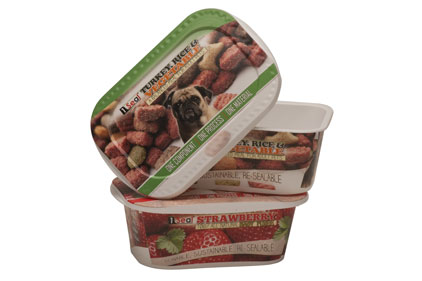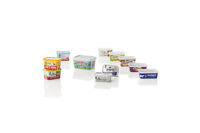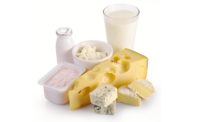In-Mold Labeling Holds Strong in North America

In-mold Labeling (IML) is coming on strong in North America after a slow start more than a decade ago. While there were several perceived barriers to the implementation of IML in North America, the technology is widely recognized for its ability to differentiate products on the shelf. To successfully implement IML requires the collaborative efforts of many supply chain partners.
implementation of IML in North America, the technology is widely recognized for its ability to differentiate products on the shelf. To successfully implement IML requires the collaborative efforts of many supply chain partners.
Spartech Packaging Technologies, a La Crosse, Wis.-based innovator of packaging solutions, announced plans to work with Inland Label, a La Crosse, Wis., developer of specialty labels using leading-edge label printing technology, to provide ILM labels for Spartech’s 1-Seal lidding technology.
The 1-Seal Lid is a packaging solution that provides a strong, environmentally-friendly package for premium brands. In comparison, traditional sealing methods require a film membrane or foil sealed directly to the tub flange, and then over-capped by a molded lid. The label graphics are displayed on the film or foil, direct printed over-cap or on a secondary label placed on the cap such as a pressure-sensitive label.
Additionally, these traditional systems require two components—a film and a cap. Alternatively, the 1-Seal lidding system creates one component manufactured in one process that can be capped and sealed to the container in one step. By leaving a portion of the in-mold label’s surface exposed inside the lid, the lid can be heat-sealed directly onto the container. The 1-Seal lid is pre-decorated and 100% recyclable in streams that accept polypropylene. Additional benefits are realized by food processors because sealing, capping and labeling are now combined into one step.
The IML project required Spartech Packaging to consider various options, including direct printing, shrink sleeves and pressure-sensitive labeling, and then implement a label-decorating strategy to complement their existing capabilities, according to Jeffrey Best, director of marketing for Spartech Packaging, a division of Spartech Corp. The challenge was to find the right type of decorating technology, and even more importantly, the best supplier with the capabilities and components needed to execute the strategy in concert with Spartech.
“Prior to 1-Seal, none of the packaging products we sold were printed or decorated,” says Best. “We recognized that we could serve an industry need by enhancing our product offerings with decoration. Containers with exceptional graphic qualities would allow Spartech and our customers to position our products for maximum consumer appeal.”
Spartech selected 1-Seal due to the processor and consumer benefits the IML technology delivers. In association with a European partner, Spartech is currently offering several products to the market in single-serve sizes, and commercializing the proprietary technology in North America first with plans to evaluate other markets in the near future.
Since IML requires collaboration throughout the supply chain, Spartech Packaging needed a North American partner to help develop its IML capability. While there are several IML label suppliers in Europe, Best notes that Spartech felt it was essential to work with domestic suppliers.
“Our domestic customers want to buy from domestic suppliers to shorten delivery times and obtain customer support and service for quickly commercializing new products,” Best says.
“We found Inland Label, a premier supplier of labels for the IML process with a proven track record in this market,” adds Mike Duff, director of strategic partner development for Spartech Packaging. “Through our selection process, Inland Label demonstrated its capabilities that go beyond the standard in-mold label, including the polymers, the label film and their technical competency in equipment and labels to help us go down this path.”
A privately-held company that has been in business for more than 65 years, Inland Label can adapt quickly to a fast-paced packaging market and changing customer requirements. The company provides leading-edge label printing technology, including offset, gravure, flexographic and digital, which enables Inland Label to supply the highest quality labels for a variety of applications.
Inland Label provides five types of labels that include injection in-mold, cut and stack, pressure-sensitive, blow mold and roll-fed labels such as roll-fed shrink labels. Inland Label also produces better performing labels to help eliminate production issues, streamline the molding process and keep costs down.
“Before Inland decided to work with us, they asked us for the business cast, including key markets, applications, market size and scale, etc., and we asked them to determine if the scale met their expectations for applying resources,” Best says.
Spartech’s preference for a domestic partner is noted as a value that aligns with Inland Label’s business model as a domestic supplier to serve the North American IML market.
“While Inland has a global perspective on the IML market, our short-term goal is to be a premier supplier of domestic labels to domestic brand owners and provide equal, if not better than, IML labels that can be had in Europe,” says Jackie Kuehlmann, marketing manager for Inland Label. “In the bigger picture however, Inland is absolutely looking to serve the IML market globally with high-quality, innovative labels that European brand owners demand.”
“We are actively working with Inland to match the service and quality offered in Europe and also extend the technology into new applications,” Duff adds.
“One thing that drew us to Spartech and the 1-Seal project is how careful they are in selecting their suppliers. That fits our model of being careful in selecting the projects we take on,” says Adam Boehlke, new business development manager for Inland Label. “We have a small but excellent R&D department, so we allocate those resources carefully. We looked at why this project would work and at the technology and resources of each company, and saw a mutually beneficial project for both companies.”
Inland Label understands the label application process and the challenges that molders face in synchronizing the molding, the label placement and the automation, Boehlke adds.
“We do a lot of upfront work to design a label that fits not just our customers’ needs but [also] their production requirements as well,” Boehlke says. “IML is a complex process with a complex supply chain, so it’s crucial to do the upfront work.”
It also helped that Inland brought the “whole package” to the partnership, Duff says.
“They are a good company to work with,” he adds. “They’re big enough to have the resources, the technical capabilities we require, but small enough to provide personal attention.”
The 1-Seal product was first commercialized in North America in March with a re-branding of Rethought Beans, all-natural, vegan, gluten- and soy-free refried beans produced by The Better Bean Co., Portland, Ore. In April, the 1-Seal technology received the 2012 SPI International Plastics Design Competition Packaging Award for packaging innovation.
Looking for a reprint of this article?
From high-res PDFs to custom plaques, order your copy today!






